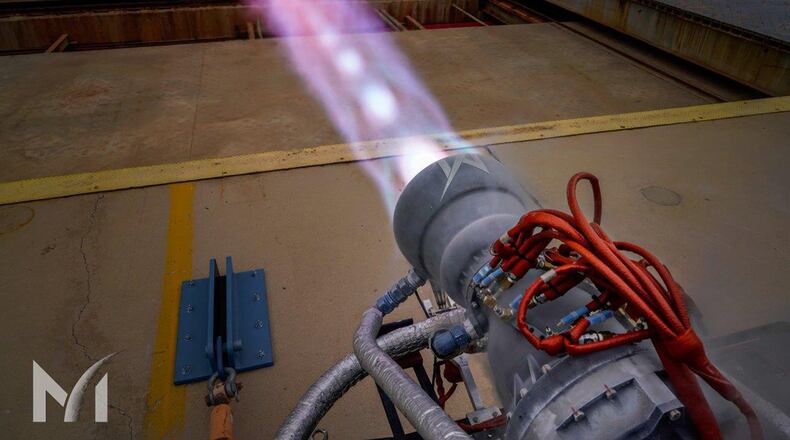The Broadsword 25K engine required a large supply of high-pressure gaseous nitrogen to pressure feed their engine. AFRL’s Aerospace Systems Directorate and their Rocket Propulsion Division at Edwards AFB has the capability at Test Area 1-125 to deliver a large supply of high-pressure gaseous nitrogen.
The hot fire campaign started in July 2019 with four hot fire tests before the final test of 10 seconds of combustion. These hot fire tests validated the tune ignition and start-up transients of the engine. The culmination of testing ended Dec. 10, 2019 when Masten completed their Broadsword 25K engine test of 10 seconds of steady state combustion. The success of these hot fire tests validated Broadsword’s startup transient and steady state performance with the new technology developed under the Tipping Point program.
“Working on the 25K Broadsword Tipping Point has been a wonderful project,” said Matthew Kuhns, chief engineer at Masten Space Systems and principle investigator on Tipping Point. “The successful hot fire testing paves the way for exciting new high performance rocket engine designs,” he added.
“The Rocket Propulsion Division is leveraging our existing research and development test capabilities by partnering with new and non-traditional defense contractors in order to accelerate speed of discovery,” said Julie Carlile, deputy chief, Rocket Propulsion Division. “Collaborating with Masten provided this opportunity utilizing our established propulsion testing infrastructure to assist the commercial space sector’s emerging small launch capabilities and lunar science missions,” she said.
The Tipping Point public-private partnership is an innovative way NASA helps industry develop promising space technologies that could benefit future commercial and government missions.
Masten was founded by CTO David Masten in 2004 and is located in Mojave, California. Masten’s main focus is “enabling space transportation and reliable planetary landers for the Earth, Moon, Mars and beyond. We are a passionate company of inventors, creators and builders with goals that include landing our own vehicle on the moon, according to the company website.”
NASA’s Space Technology Mission Directorate, which invests in and develops transformative space technologies to enable future missions, selected Masten for a Tipping Point award to mature the M10A 25,000 lbf liquid oxygen/methane Broadsword Engine in 2017. NASA Tipping Point contracts are awarded to companies with technologies that are on the verge of maturation and are likely to benefit both NASA and the commercial space market.
The AFRL Rocket Lab at Edwards AFB has played a key role in advancing rocket engine technologies for the nation since 1952. AFRL has been a prominent player in nearly every liquid rocket engine developed and flown by the United States. This testing is a trailblazer for future liquid methane engine tests and partnerships among the commercial rocket industries.
About the Author
